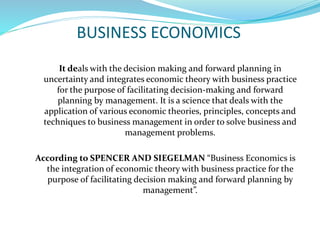Investigating How Business and Economics Affect Buying Decisions
Investigating How Business and Economics Affect Buying Decisions
Blog Article
Comprehending Economic Principles for Better Business Decision-Making
In the complex landscape of modern-day organization, a complete understanding of financial concepts can dramatically boost decision-making procedures. By taking a look at elements such as market structures and customer behavior, organizations can customize their approaches to straighten with affordable dynamics and consumer demands. In addition, understandings into need elasticity and opportunity prices offer a framework for maximizing resource appropriation. However, the application of these financial concepts typically discloses unforeseen challenges and opportunities that can redefine calculated approaches. What ramifications do these understandings hold for the future of company approach?
The Basics of Economic Theory
Financial theory acts as the foundation for understanding just how companies and people choose in the presence of shortage. At its core, economic theory takes a look at the appropriation of limited sources to please endless desires. This essential concept of deficiency necessitates trade-offs, engaging decision-makers to examine the expenses and advantages connected with numerous options.
The 2 key branches of economic concept are microeconomics and macroeconomics. Microeconomics concentrates on specific representatives, such as companies and customers, assessing their habits and communications in specific markets. It emphasizes concepts like supply and need, rate flexibility, and market equilibrium, which are essential for recognizing just how costs are figured out and exactly how resources are distributed.
Alternatively, macroeconomics checks out the economic situation all at once, resolving more comprehensive problems such as inflation, unemployment, and financial development. It offers insights into systemic sensations that impact all economic agents, directing policymakers in crafting effective financial methods.
Eventually, a strong grounding in financial theory is important for effective company decision-making. By understanding the concepts of deficiency, compromises, and market characteristics, organizations can much better make and navigate complex atmospheres informed selections that improve their competitive benefit.
Key Economic Indicators
Trick economic indications act as important tools for examining the health and instructions of an economy, giving useful understandings for company decision-making. These indications are measurable steps that show the economic efficiency and can be classified into leading, delaying, and coincident indications.
Leading signs, such as customer confidence indexes and securities market fads, anticipate future economic task, allowing companies to prepare for changes in the market. Lagging signs, like joblessness rates and business earnings, provide insights right into the economic situation's past efficiency, helping organizations to evaluate long-lasting fads. Coincident indications, such as GDP growth and retail sales, change all at once with the economy, offering a real-time picture of financial problems.
Recognizing these indicators allows services to make enlightened choices regarding investments, resource allotment, and calculated preparation. A surge in customer self-confidence may trigger business to enhance production in anticipation of higher demand. Conversely, rising unemployment prices may cause a reevaluation of growth strategies. By carefully keeping track of these vital financial signs, companies can navigate uncertainties and position themselves properly in the ever-changing economic landscape, inevitably boosting their decision-making procedures and lasting success.

Market Frameworks and Dynamics
Comprehending market frameworks and characteristics is vital for businesses intending to thrive in affordable settings. Market frameworks, broadly categorized right into excellent competition, monopolistic competition, oligopoly, and syndicate, significantly affect pricing strategies, product distinction, and affordable habits. Each structure offers unique obstacles and opportunities that can determine a company's calculated instructions.
Oligopolies, defined by a few leading players, lead to interdependent decision-making; companies must carefully consider competitors' actions to their actions. Monopolies exist when a single firm manages the market, resulting in maximum pricing power yet frequently drawing in governing analysis.
Recognizing these characteristics enables businesses to expect market patterns, adjust strategies, and optimize resource allocation. Furthermore, recognizing exactly how exterior aspects like innovation and regulation impact these structures can boost strategic planning. By mastering market frameworks and characteristics, firms can make informed choices, eventually boosting their affordable setting and driving sustainable growth.
Customer Actions Insights
Customer behavior plays a crucial function fit organization techniques and results. Comprehending exactly how consumers make buying choices, their preferences, and the factors influencing their actions can dramatically improve a firm's capacity to fulfill market demands. Trick understandings into consumer behavior can be acquired from examining demographics, psychographics, and behavior patterns.
Market elements such as age, education and learning, sex, and earnings degree supply a fundamental understanding of target markets. Psychographics dive much deeper, discovering consumers' way of lives, worths, and perspectives, which can affect brand name commitment and product assumption. Behavior insights, such as buying regularity and response to promotions, are vital for customizing marketing initiatives.
In addition, outside variables like financial conditions, social trends, and technological innovations additionally influence consumer selections. As an example, throughout financial downturns, consumers might prioritize necessary products over high-end things, changing demand patterns.
Applying Economics to Technique
Insights got from customer actions contribute in creating reliable organization strategies. By leveraging financial principles, businesses can much better recognize market characteristics, optimize source allocation, and enhance affordable placing. Examining demand flexibility, for example, makes it possible for firms to go to my blog adjust prices techniques to make best use of earnings while staying appealing to customers.
In addition, understanding market segmentation enables organizations to customize their offerings, guaranteeing they browse this site fulfill the certain needs and preferences of diverse consumer teams. Business and Economics. This targeted strategy enhances customer satisfaction and cultivates brand name commitment
:max_bytes(150000):strip_icc()/Investopedia-terms-business-cycle-eb0d2a616c914caf87c35491ed78ae2e.jpg)
Incorporating game concept right into calculated planning additionally provides insights into competitive behavior, enabling companies to expect competing activities and create counter-strategies properly.

Conclusion
To conclude, a detailed understanding of financial principles significantly improves organization decision-making. By checking out market frameworks, evaluating consumer actions, and analyzing vital financial indications, firms can develop effective approaches that line up with market needs. The application of principles such as need elasticity and possibility costs better help in optimizing source allotment and financial investment decisions. Inevitably, integrating these economic theories cultivates enhanced critical options, facilitating much better anticipation of market patterns and competitive activities, consequently driving productivity.
In the facility landscape of contemporary organization, an extensive understanding of financial principles can considerably improve decision-making processes.Leading signs, such as consumer self-confidence why not try this out indexes and stock market patterns, anticipate future economic activity, enabling companies to expect modifications in the market. By very closely checking these crucial economic indications, services can browse unpredictabilities and position themselves successfully in the ever-changing financial landscape, ultimately enhancing their decision-making procedures and lasting success.
By leveraging economic concepts, services can better comprehend market dynamics, optimize source allocation, and enhance competitive positioning.In final thought, a thorough understanding of financial principles significantly enhances service decision-making.
Report this page